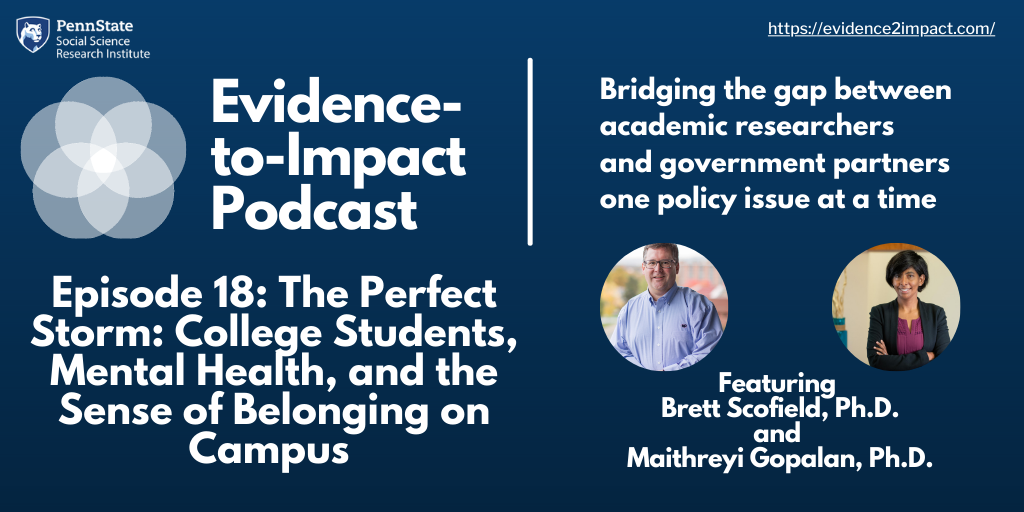
The Social Science Research Institute’s Evidence-to-Impact Podcast returns for a third season with its eighteenth episode, “The Perfect Storm: College Students, Mental Health, and the Sense of Belonging on Campus.”
The podcast’s moderator, Michael Donovan, the associate director of the Evidence-to-Impact Collaborative, spoke with Maithreyi Gopalan, Ph.D., assistant professor of education and public policy and Social Science Research Institute co-funded faculty member at Penn State, and Brett Scofield, Ph.D., associate director of Counseling and Psychological Services at Penn State and executive director of Center for Collegiate Mental Health. The episode covers how COVID-19 has impacted college students seeking mental health services, the challenges for counselors and administrators working in university mental health centers, policy solutions to the crisis, and other things that have happened as a result of the pandemic like changes in technology.
On the intersection of technology, mental health, and the pandemic, Scofield notes, “We certainly, in March of 2020, had to pivot in very short notice to remote services for students. That was telephone at first and telehealth services and video conferencing platform services like Zoom in order to meet student needs. And that's been ongoing since, in terms of tele-health what we have found, it certainly is a way to be very adaptable and it's a way to increase access for services.”
Scofield added, “Technology has helped us increase access for certain groups or certain people, but it has been a deterrent for others. So, for example the LGBTQ+ community, certainly that's well-known that telehealth services can be an increasingly desirable option for that community because it can create access, but there's other students who it might serve as a deterrent, and they might not opt into telehealth at all, because that might be a barrier.”
However, Gopalan noted the silver lining of the mental health crisis, “I think the one silver lining for me is the attention [that] college student mental health is receiving during this pandemic, the fact that it's brought to national attention, the fact that students, depression and anxiety have been through the roof and that they might not be seeking or having access to the care that they need in colleges is really come to the fore. And public consciousness has been multiple articles in New York times talking about that, the social isolation and the loneliness has been talked about quite a bit. The U.S. Surgeon General talked about a youth mental health pandemic recently.”
Gopalan asked, “How can we do prevention efforts so that maybe advisors can seek out and provide services? Maybe they can reach out to students and check in and there's been a lot of interesting prevention interventions studied from the education policy angle as well, where staff and advisor reaching out through text messages, peer mentoring groups set up on campus having an effect on students feeling like they belong on campus and to together ride the wave that they have been on right now is something that we should be thinking about.”
Listen to the full episode here.